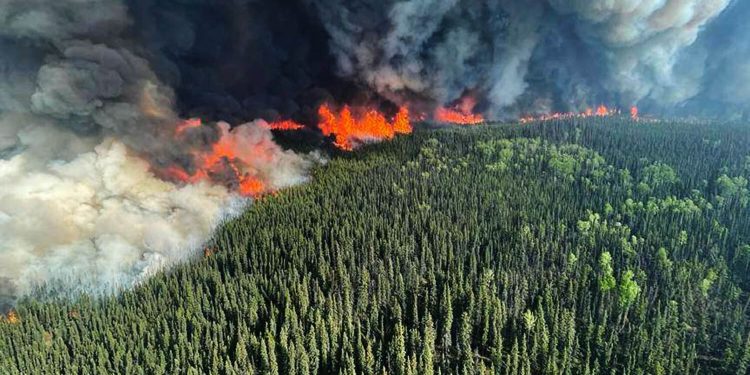With hundreds of Canadian wildfires sending smoke across the northern United States, the conservatives have begun to query the culpability or otherwise of climate change for the supposedly largest destructive fire in North America.
Steven Milloy, a “Senior Fellow” at the fossil fuel-funded E&E Legal Institute, claimed on Fox News that the Canada fire is not related to climate change and that the smoke from the fire does not have any health consequences.
Canada wildfires
Wildfires are unplanned fires that burn in forests, grasslands and other ecosystems, and they can start with a natural event like a lightning strike, or as the result of human activity. Campfires, discarded cigarettes, and electrical equipment like downed power lines all spark wildfires.
Canada faces ‘long, tough summer’ of wildfires with even hotter temperatures and the Canadian officials have warned that the country faces a “long, tough summer” of wildfires as the current season shatters previous records and forecasts predict even hotter temperatures to come.
More than 155,000 people have been forced from their homes, the highest figure in 40 years, with more than 4,500 evacuees across Canada – the majority of whom are First Nations.
Debunking misinformation about Canadian wildfires
While a not-significant chorus of Canadians blame the current wildfires sweeping across much of the country on arson by climate activists, and laser-less government operatives willing to drive into the woods and strike a match, scientists say changes in the climate are making weather conditions like heat and drought that lead to wildfires more likely,” the BBC reported in June. “Spring in Canada has been much warmer and drier than usual, creating a tinder-dry environment for these 1vast fires.”
Given how much energy these fires have while they burn, it is pretty much impossible for them to stop unless large swaths of heavy rains come their way,” said Apostolos Voulgarakis, a professor of climate change at Imperial College London.
Scientists explain that climate change affects wildfires by exacerbating the hot, dry conditions that help these fires catch and spread.
As global temperatures rise, the size, frequency, and 1Qqq of wildfires are expected to increase in the years ahead.
Already, the average wildfire season in the western U.S. is over three months longer than it was a few decades back. In places from California to the Siberian Arctic, we’re seeing record-breaking wildfires.
Apparently, there is abundant evidence climate change makes environments more susceptible to burning, and increasing severe heat and drought due to climate change can fuel wildfires.
Hotter temperatures evaporate more moisture from soil and vegetation, drying out trees, shrubs and grass and turning leaf litter and fallen branches into kindling.
In times of drought, trees that are stressed by a lack of water may also become more vulnerable to insects and diseases that can weaken or kill them, creating more fuel for fires.
Though fire is a natural phenomenon that serves important ecological purposes, clearing dead and diseased plants from some forests, for example, and even helping some plants reproduce; but a rapidly warming planet — along with a history of short-sighted forest management practices and land use decisions that push development into the wilderness — is contributing to more destructive wildfires.
Verdict
As the right-wing media is peddling dangerous ideas about what’s causing Canada’s wildfires, overwhelming findings reveal that the effect of climate is worsening the experienced wildfires outbreak in Canada.
This content was produced with support from the Independent Media Response Fund, an initiative of the Check Global Program at Meedan to respond to global challenges through hyperlocal initiatives. The fund is supported by the Swedish International Development Cooperation Agency (Sida).

